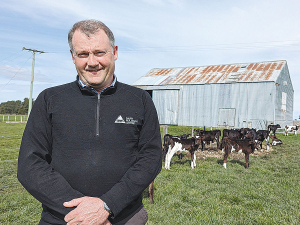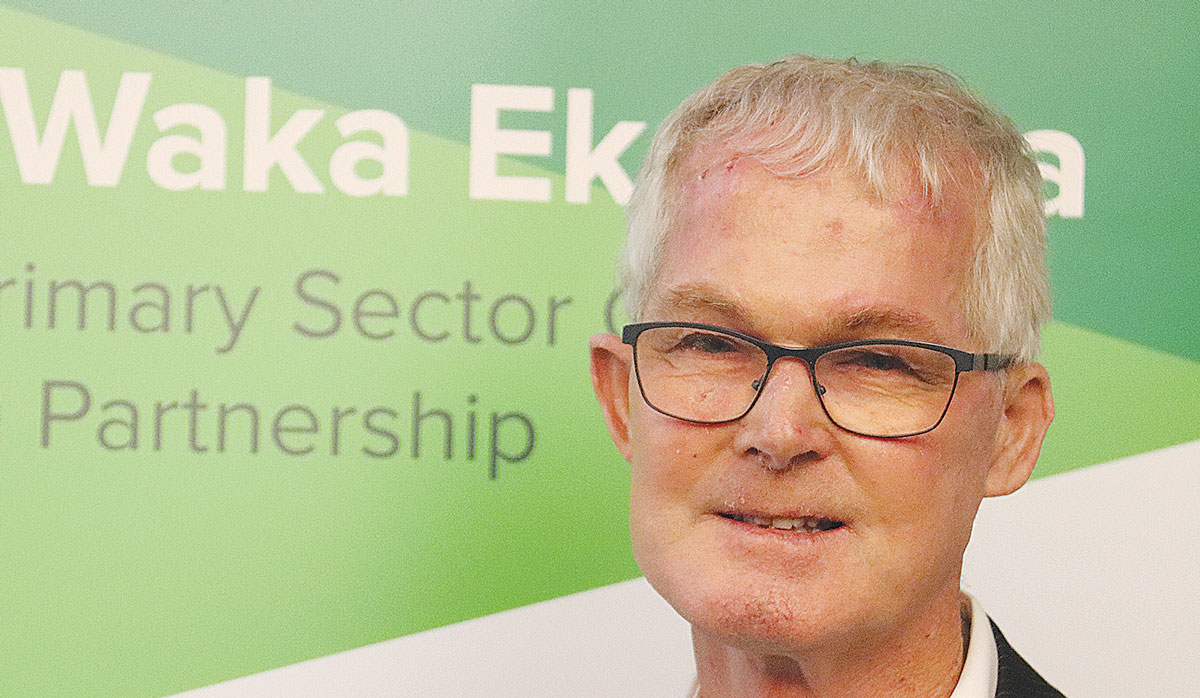DairyNZ Levy Vote Underway as Chair Highlights Seven-Fold Return
Voting has started for the renewal of DairyNZ's milksolids levy.
 Retiring DairyNZ director Colin Glass says apart from the current reset around payout, there were a couple of “headwinds” facing the industry.
Retiring DairyNZ director Colin Glass says apart from the current reset around payout, there were a couple of “headwinds” facing the industry.
The pressures coming to bear on dairy farming mean a lot of farming businesses are not viable, warns retiring DairyNZ board member Colin Glass.
"They need to really look at themselves and make the changes that they need to, to ensure that they're going to be here for tomorrow," he says.
Glass says many of those who grew the industry are now reaching the point of retirement and handing their assets on, but the new generation coming through doesn't necessarily have the same passion as their parents, and their expectations are quite different.
He has noticed at farmer meetings some "quite divergent" views among farmers of DairyNZ's role.
"There's a whole lot of people out there that simply want to be able to carry on doing what they have always done and they're happy for any advice that they get - so long as it's what they want to hear.
"We've got to realise that we do have to make changes over some things and DairyNZ's role is not to be there to please everyone. It's there actually to lead our industry forward and make New Zealand dairy farming better."
Apart from the current reset around payout, Glass said there were a couple of "headwinds" facing the industry including getting the He Waka Eke Noa emissions regimen in place.
Getting all the parties of New Zealand agriculture together in broad agreement has been a massive achievement, he says.
And the Government is now starting to realise the unique nature of New Zealand pastoral farming. He says our great strength is growing grass so we are very different to other countries' largely barn-based systems but that means our biggest challenges will be in managing greenhouse gas emissions.
Glass says we also have "a very long journey ahead of us" around managing our catchments at a regional level.
"New Zealand's got some decisions to make. Do we want to de-intensify our farms in provincial New Zealand and move back to a very low touch system or do we actually want to have active and vibrant provincial communities?
"The industry bodies have a key role to play with being involved and representing farmers to ensure that our rural communities can be vibrant and can be profitable into the future."
Glass spoke to Dairy News on the day voting opened for two open positions on the DairyNZ board. He is retiring by rotation and has chosen not to stand for re-election.
Looking back on his two terms, Glass is proud that DairyNZ has strengthened as the voice of the dairy industry.
Previously the Government might have gone sometimes to Fonterra for matters affecting the industry, and sometimes to some other organisations.
"So, the thing that I'm quite proud of within DairyNZ is that it's become the go-to organisation over the last six years," he says.
"I've seen DairyNZ get very close to MPI, and close than it was with MfE [Ministry for the Environment] in Wellington.
"So the Wellington connections I think have really grown quite strongly over that time. You could probably argue that M. bovis has been the catalyst for that."
Glass says the M. bovis programme is well on the way to success.
"But for me the big success is that Government, Beef+Lamb and DairyNZ have been working closely for the first time ever.
"When you step back and you look back over those six years and you see what's playing out there, MPI I think have gained a healthy respect for industry and industry equally have become aware of the challenges that MPI have to work through.
"I'd argue that Wellington was very disconnected before the M. bovis response."
Glass, the fulltime CEO of Dairy Holdings, said his time on the board had been a great journey but increasingly a juggling act while both his own business and Dairy Holdings kept growing.
"So after six years on the DairyNZ board, I felt that I either need to step up into a bigger role there or it's time for me to move on and look at the next thing.
"The sheer time commitment I've got within our own business and Dairy Holdings, that was really demanding."
With his wife Paula (herself a part-time accountant with Dairy Holdings) Glass runs a dairy and dairy support business across three blocks just south of Methven.
"This is what we do in our spare time," he jokes.
The business consists of a dairy farm currently with 670 milkers, a home block and another where they rear about 500 bull calves to be sold as two-year-olds either for beef or as dairy service bulls.
They used to graze heifers and wintering cows off-farm but as of this year are keeping them at home.
Already the biggest dairy group in the country, Dairy Holdings now boasts about 57,000 milking cows.
Vote South!
As the only South Island representative on the DairyNZ board, retiring member Colin Glass says it would be good for another South Islander to be elected in the voting now underway.
With both Glass and board chair Jim van der Poel retiring by rotation, there are two vacancies to be filled. Van der Poel is standing again but Glass is not.
 |
|---|
|
DairyNZ chair Jim van der Poel is running for re-election. |
Thirteen candidates are standing, and Glass says it's not his place to endorse any one.
"But look, I've worked alongside Jim for my whole time on the DairyNZ board and I can't speak highly enough of him.
"He's always had a very strong passion for farmers and for the industry."
Glass says he's not met anyone in a similar role willing to put in the time and effort that van der Poel does.
"I think he does an outstanding job."
But there are some other good candidates, he says.
"I think it's really important that the South Island view is heard and the awareness out of the South Island is put forward."
Glass says it's not often recognised that about 48% of New Zealand's milk supply now comes out of the South Island. Canterbury's contribution is larger than the Waikato, and Southland's larger than Taranaki, he says.
"So, it's no longer about the importance of Waikato. It's now very much about the importance of the South Island, and what's sustainable and achievable down here."
Four of the 13 hopefuls are from the South.
Former Fonterra executive Alex Turnbull has been appointed CEO to lead all five Yili Oceania Business Division companies in New Zealand.
Fonterra executive René Dedoncker is leaving the co-operative later this year to lead Australian agribusiness Elders.
Alliance Group and the Southland Stags rugby team have joined forces in a partnership that will see the the meat co-operative's farmgate brand feature on players' team kits and replica jerseys.
Fonterra's plan to expand its organic programme to the South Island is being well received by farmers, the co-op says.
Voting has started for the renewal of DairyNZ's milksolids levy.
The most successful catchment groups in NZ are those that have 'a source to sea' approach.
OPINION: A dairy version of fantasy football has been launched.
OPINION: In recent weeks beaches in Auckland, Wellington and Christchurch have been unsafe to swim in because of recent heavy…